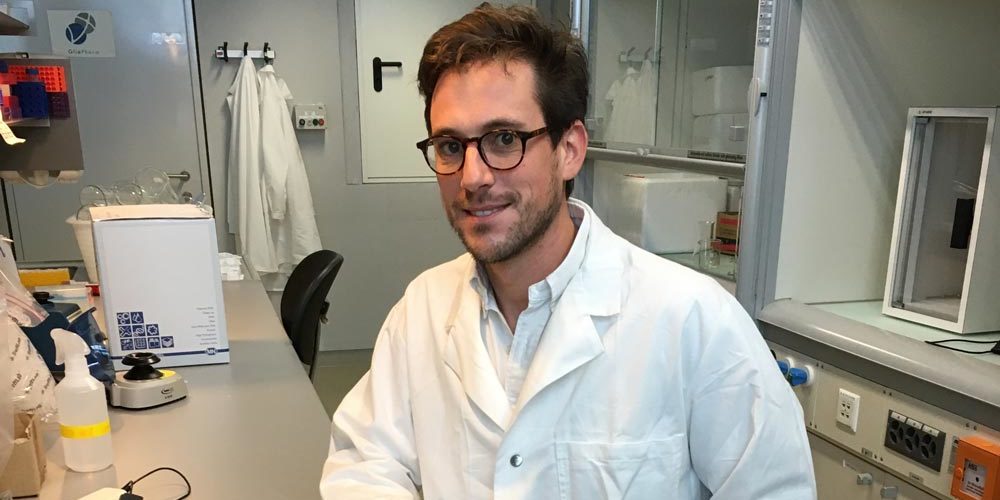From academia to entrepreneurship – seizing an opportunity to make a significant contribution to the treatment of neurological disorders
17 December 2020

We spoke with Charles Finsterwald, PhD, Chief Scientific Officer and co-founder of the start-up Gliapharm about his career path and his decision to switch from fundamental research to application.
An interest in neuroscience
After a bachelor in biology and a master’s in biomedical studies from UNIL, Charles Finsterwald earned his PhD in neuroscience from the Lemanic Neuroscience Doctoral School where he worked in the lab of Dr Jean-Luc Martin at the Centre for Psychiatric Neuroscience on understanding the mechanisms underlying neurotropic factors during brain development. After his PhD, Charles accepted a postdoc position, funded by the Swiss National Science Foundation, to work in the lab of Professor Cristina Alberini at New York University (NYU), where he investigated the role of stress on memory formation, in particular in post-traumatic stress disorder (PTSD). While pursing his postdoc, Charles also graduated in project management at NYU, gaining experience in the field of management and underlying business perspectives that he found to be very complementary to fundamental science.
Entrepreneurship opportunity knocks
When Charles returned to Switzerland, he was invited by Professor Magistretti in 2014 to join a team at EPFL to work under the terms of an Innosuisse grant to explore the viability of launching a start-up that would seek clinical applications derived from the discovery that glial cells and specifically astrocytes play a fundamental role in the control of brain metabolism. This could represent an innovative target for new therapeutic solutions as brain metabolism is reduced in a number of neurological disorders. Over the same period, Charles completed EPFL’s classes on entrepreneurship, gaining a theoretical and practical overview of issues in company management, business development, funding strategies, and intellectual property matters. These different courses provided Charles with the tools of entrepreneurship, which he was able to combine with his lifelong passion for science.
Gliapharm was subsequently incorporated in 2016. Charles, fascinated by the potential of this line of work to make a major contribution to treatment of neurological pathologies, joined the new company as co-founder, board member and Chief Scientific Officer.
Gliapharm aims at targeting glial cells in order to stimulate their activity and boost the metabolism of specific brain areas and for different indications that have an impaired brain energy metabolism. Gliapharm believes that glial cells – astrocytes in particular – offer unique and important perspectives in the treatment of neurological pathologies such as amyotrophic lateral sclerosis (ALS), Alzheimer’s disease and depression. The metabolic boost that astrocytes allow could also be applied in a preventative approach in specific cases. ●
by Peter Hislaire
Gliapharm: Milestones
1980s, 1990s, 2000s
Fundamental science, looking at characteristics of glial cells, leading to an understanding of the therapeutic potential of glial cells, by various research institutes and universities, with strong leadership by Prof. Pierre Magistretti of EPFL.
2014 – 2015
Funding from Innosuisse to develop the concept and look at business planning, intellectual property issues, human resources aspects, engaging with investors. Coaching provided through Innosuisse proved very useful in setting up systems and operations. Gliapharm also set up an independent scientific advisory board, which provides key guidance in drug development and clinical aspects.
2016 – present
Co-funding by Innosuisse and the Puccini Foundation has allowed Gliapharm to establish an operational base and lab at Campus Biotech, conduct research and development, and cultivate technical, academic, industrial and financial partnerships, mainly with USA, France, Switzerland and indeed Campus Biotech based actors.
2019
Gliapharm raised an additional CHF 2 millions from diverse business interests. This allowed Gliapharm to intensify data collection and put together a full team with the requisite expertise. Biology is kept in house, while medicinal chemistry is out-sourced. Gliapharm also works with a number of CROs (contract research organisations) on regulatory aspects or preclinical pharmacology for example.
2021 and beyond (planned)
Raising CHF 10-20 million to intensify work aiming at producing a clinical candidate within 2 years, and conducting proof of concept clinical studies in an orphan neurological indication. Continue research and development of molecules to trigger brain metabolic activity for specific indications.
2023 and beyond
Be in a position to begin Clinical trials. ●
